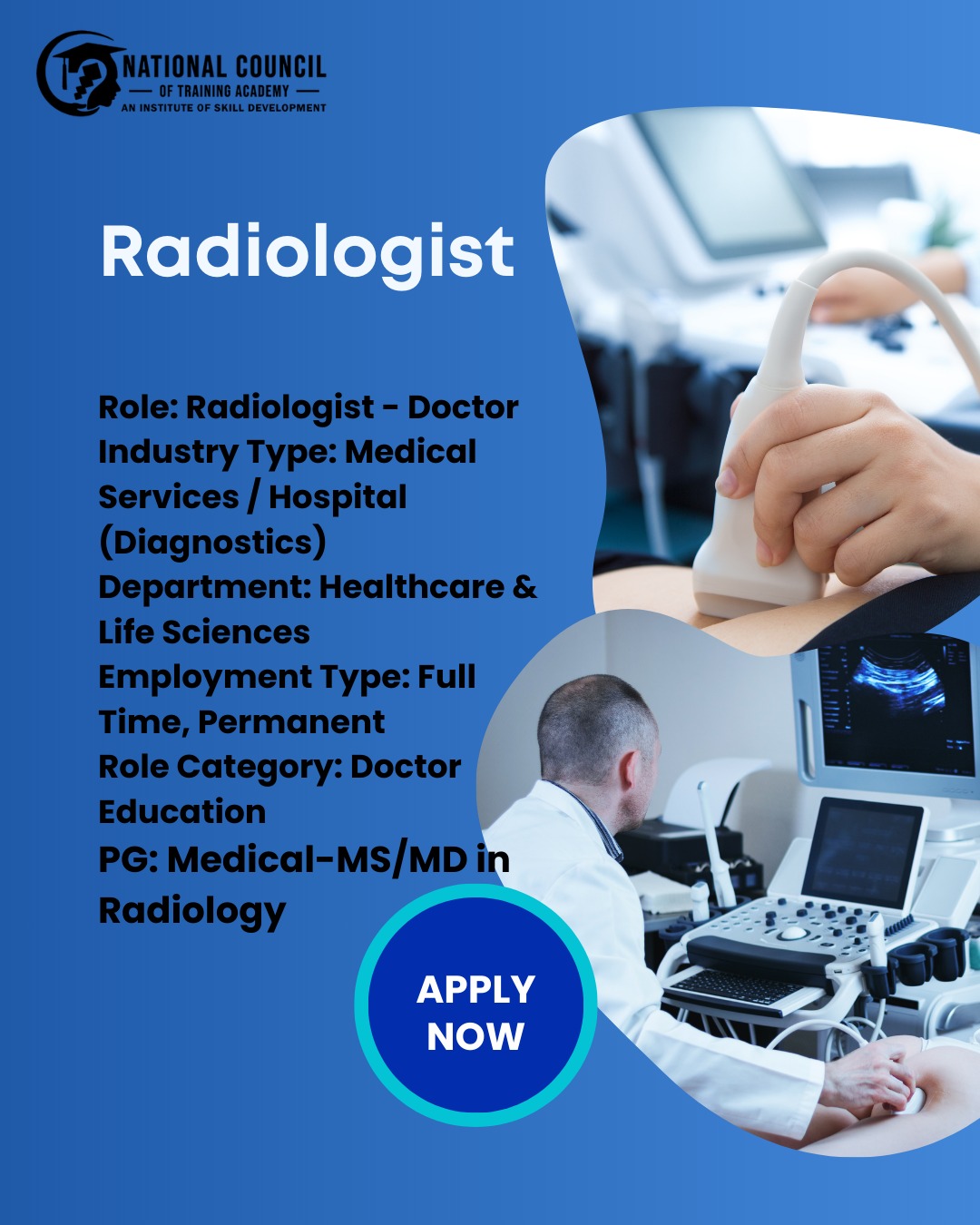
Advanced Diploma In Radiology Assistant (ADRA)
By NCTA Team Last Updated: January 16, 2026Overview:
A radiology assistant is a healthcare professional who works under the supervision of radiologists and radiologic technologists to assist in various tasks related to diagnostic imaging. Their primary role is to help with the preparation of patients for imaging procedures, ensuring they are positioned correctly and comfortable during exams. Radiology assistants may also assist in obtaining medical histories, explaining procedures to patients, and ensuring that all necessary forms and documentation are completed.
Course description:
Advanced Diploma in Radiology Assistant (ADRA) is a one-year, specialized online program offered by the National Council of Training Academy. This course is designed to provide students with advanced skills and knowledge to work as proficient radiology assistants in healthcare settings. The program covers a wide range of diagnostic imaging techniques, including X-rays, CT scans, MRIs, and ultrasounds, ensuring students gain expertise in patient preparation, positioning, image quality assurance, and radiation safety protocols.
Throughout the course, students will learn how to assist radiologists in performing imaging procedures, managing patient care, and ensuring the accurate and safe operation of imaging equipment. The program combines theoretical knowledge with practical experience to prepare students for vital roles in radiology departments, clinics, and diagnostic centers.
To seek admission in our online radiology assistant course, candidates must be at least seventeen years of age and have completed their 10th grade education. This course offers flexibility through online learning, allowing students to gain professional qualifications while balancing their personal commitments.
Objectives:
Advanced Diploma in Radiology Assistant (ADRA) aims to equip students with the skills and knowledge to assist radiologists in diagnostic imaging procedures, patient care, and radiation safety while ensuring high-quality imaging in healthcare settings.
Course Curriculum:
Through a blend of theoretical learning and practical training, students will develop expertise in handling radiographic equipment, ensuring patient safety, and assisting in various imaging modalities like X-rays, CT scans, MRIs, and ultrasounds. The curriculum is structured to equip students with the knowledge and hands-on experience needed for a successful career as a radiology assistant in hospitals, diagnostic centers, and clinics. Below is the detailed curriculum:
- Basic Anatomy and Physiology
- Radiological Physics
- Radio Graphic Technique
- Radiation Biology
- Imaging Modalities
- Radiation protection in Medical Radiography
- Basics of Computer
- Project work /Dissertation
Career Opportunities:
Graduates of the Advanced Diploma in Radiology Assistant (ADRA) can explore various career opportunities in the healthcare sector, including:
- Radiology Assistant: Assist radiologists in performing imaging procedures such as X-rays, CT scans, MRIs, and ultrasounds.
- Radiology Technician: Operate and maintain imaging equipment while ensuring high-quality diagnostic images.
- Medical Imaging Assistant: Support radiology teams by preparing patients, managing imaging records, and ensuring workflow efficiency.
- Radiology Department Coordinator: Oversee administrative tasks, schedule imaging procedures, and assist in department management.
- Diagnostic Center Assistant: Work in private diagnostic labs or imaging centers, assisting in image acquisition and patient care.
- Specialized Imaging Roles: With additional training, specialize in advanced modalities like mammography, interventional radiology, or nuclear medicine.
- Supervisory and Management Roles: Gain experience and advance into leadership positions within radiology departments or healthcare facilities.
Salary Expectations:
The salary for Advanced Diploma in Radiology Assistant (ADRA) graduates varies based on experience, location, and workplace. Entry-level radiology assistants can expect to earn between ₹2.5 and ₹4.5 LPA (Lakhs Per Annum) in India, while experienced professionals in hospitals, diagnostic centers, and private clinics can earn up to ₹6 and ₹8 LPA. In countries like the USA, UK, and UAE, salaries tend to be higher, ranging from $30,000 to $50,000 per year for beginners and increasing with experience and specialization.
Course Features
| Course Code | NCTA-158 |
| Duration | 1 YEAR/540 HOURS |
| Category | Advanced Diploma In Radiology Assistant (ADRA) |
| Eligibility | 12TH PASS/2-10 Year Experience in Relevant Field |
| Fees | INR(₹) 18000.00/ USD ($) 330 |
To know more about our this course, feel free to call us at:
+91 9733600770Ready to Enroll in This Course?
Start your learning journey today and unlock your potential!
Apply Now for This CourseCurrent Job Opportunities for This Course
Radiologist Doctor – Apollo Hospitals Delhi NCR
Apollo Hospitals Delhi / NCR (Indraprastha Apollo Hospitals, New Delhi)Indraprastha Apollo Hospitals, New Delhi is inviting applications for the position of Radiologist Doctor for full-time roles in diagnostic and radiology services.
Read MoreSenior Resident – Radiology (Corporate Hospital, Delhi)
Consultancy Services (Posted by HealthCon) New DelhiCorporate hospital in Delhi is hiring a Senior Resident (Radiology) with MD/DNB/DMRD qualification and up to 3 years of experience, offering a negotiable salary of up to ₹37.5 LPA.
Read MoreDental Assistant (Clinical Assistant)
Rudra Dental Chennai (Anakaputhur)Prabhi Travels is hiring an International Travel Consultant in New Delhi (Janakpuri). The role involves selling international holiday packages, creating customized itineraries, handling travel inquiries, and ensuring excellent customer service. Attractive incentives and performance bonuses are offered.
Read MoreWanted Medical lab Technologist & Radiographer Vacancy in Kuwait under
Resolve Navi Mumbai, Kuwait, Delhi / NCRAbout company: RESOLVE provides specialized knowledge to the Pharmaceutical, Biotech and Healthcare industries. The availability of large Professional along with the shortened time of delivery empowers us to reduce the costs of the Clients and revamp their business.Our expertise complements the Client and our technologies can be accessed through collaboration Our services can be utilized to handle a multitude of complex computational challenges faced by Pharmaceutical, Biotech and Healthcare companies.
Read More



